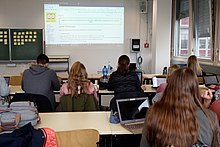Seminar on wikis in education
Author: Ziko van Dijk
Social Media channels or hashtags:
Summary: In February 2019, I guided a seminar at a German university on wikis in education. This contribution describes the goals, the programme and the results. A major element was the German wiki encyclopedia for children, Klexikon.

For a long time, Wikipedia and/or other wikis are topics in university classes and in schools. This seminar was directed to students at the University Duisburg-Essen in Germany, at the institute for linguistics. All students in the seminar are supposed to become teachers of German, in secondary schools or community colleges. The seminar has to fit in the section media didactics which is relevant for their credit points schedule. Usually a student is going to teach German language and also one or two other subjects. Most of the students are rather progressed in their studies, some are immediately going to schools for an internship.
There is a longer tradition at the university to use wikis in one way or the other, so some students already heard about the topic in other seminars. The goal of the seminar was to introduce the students in media didactics and the use of wikis as a topic or as a teaching tool. I drew partially from my new paper on 'Wikis im Unterricht reflektieren und bearbeiten' (soon to appear).
The programme covered:
- an introduction to media in general and, in a second part,
- an introduction to media in teaching (Medienpädagogik/Mediendidaktik)
- a theory on wikis, based on my upcoming book on wikis: wikis as (social) media, basic model, typology of wikis, general aspects such as openness/closedness, macro structures etc.
- a small overview on several wikis such as Wiktionary, Wikidata and Memory Alpha
- writing articles for the Klexikon
The Klexikon part was introduced with an exercise on readability; the students later confirmed that this was a necessary first step before writing articles for children. That writing turned out to be more challenging than many students expected, and I am going to reserve (even) more time for it in future. The students learned not only about linguistic features of for-children-writing but also about the constraints with regard to content. Some of them already consider to use the Klexikon later in their teacher's life (for older pupils, not children in the target group).
I change my seminars from time to time and adapt them to the requirements of the institution. I also like to experiment with different topics and settings. This time media theory had a larger role than previously, which turned out to be a very useful reference point. In general, the seminar felt (for me) well rounded, and I think that the students would agree. Although that was no official goal, the students also became familiar with the ideas of the Wikimedia movement.